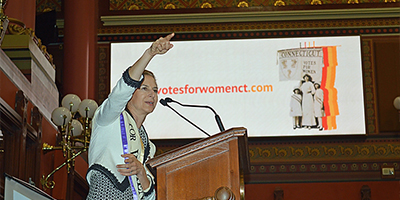
Merrill: Suffragettes Were No ‘ Shrinking Violets’ New Commission Celebrates Women’s Movement
Secretary of the State Denise Merrill, Lt. Gov. Susan Bysiewicz, and First Lady Annie Lamont kicked off a year-long celebration of the passage of the 19th Amendment and the Women’s Suffrage Movement on Thursday.
The trio helped gather hundreds of women from all over the state in the House chamber for Thursday’s opening ceremony for the new Connecticut Women’s Suffrage Centennial Commission. The commission, which will be co-chaired by Annie Lamont, Merrill, and Bysiewicz, will be working with Connecticut’s towns and cities to celebrate the 100th anniversary of women’s suffrage throughout 2020.
Merrill, Lamont and Bysiewicz all spoke at Thursday’s ceremony.
“We sit in the shade of trees we did not plant,” Merrill reminded the women in the chamber.
Those women staged protests, took off their corsets, went to jail, and endured hunger strikes that ended with forced feedings.
“This was not a group of lady-like shrinking violets,” Merrill said. “This was a very long and intense struggle that took many forms.”
She said what interests her about the movement is that the women “learned to do politics — small p. They are arguably the first organizers ever in this country because they learned how to do things like media — white outfits — later on many other posters and events where they made their point. And lobbying. They pretty much invented lobbying.”
Throughout the program, organizers in “suffragette white” pointed out that while there were many leaders from Connecticut in the movement, the history is neither entirely rosy nor complete. It took decades before women of color had the right to vote, and there is less documentation of their history.
Ilene Frank of the Connecticut Historical Society urged those in the room to help bring those stories forward into the light. She called upon the audience to look at their town records, the histories of local churches, and for families to search their attics and scrapbooks to help tell the stories of African-American women and give them their place in Connecticut’s voting history.
Merrill said history tells them the first words uttered in the Connecticut House chamber came from Mary Mather Hooker, a Republican from Hartford who was the first woman elected to the General Assembly in 1920.
Merrill read Mather Hooker’s statement aloud: “We women want the men in the House to feel that they may smoke just as if there were no women legislators present.”
Merrill said that the statement was not exactly auspicious as a maiden-floor speech, but they were still trying to be nice.
“We don’t quite expect the men in the chamber to carry on as if we’re not here anymore, do we?” Merrill said to applause.

But Thursday’s event wasn’t just about the past.
“There’s still much to be done. While we’re celebrating we’re also going to look to the future, not just to the past, and ask ourselves how we are going to continue this fight for equality and democracy?” Merrill said.
Lamont, a venture capitalist for the past 30 years, said there has been very little progress in recruiting more women to get into that industry.
“It just didn’t make sense to me. Women have all the natural attributes to be great investors,” Lamont said. “And it’s an industry where you can measure and quantify your results.”
She said that when she created her own firm five years ago she made an effort to recruit female partners. She said over half of her partners are women.
“It is important to lead by example and when you find yourself in a position to affect change, you have to take on the responsibility to do so,” Lamont said.
She said what’s amazing about the suffragettes is they had to break the doors down because what they wanted to accomplish could never be accomplished from the inside.
Lamont said suffragettes were what the tech world refers to as the “bleeding edge, which becomes the leading edge, and then becomes the standard or the norm. And this is what progressive do, they change the world by daring to do the uncomfortable and unpopular thing.”
She added that this is what her husband’s administration has been focused on since day one.
“Challenging the status quo to make Connecticut stronger and better in every way,” Lamont said. “Including Ned’s push to have more women, as Susan referenced, and people of color and from the private sector who look at the traditional challenges we face in new and innovative ways.”
Original article can be found here.
